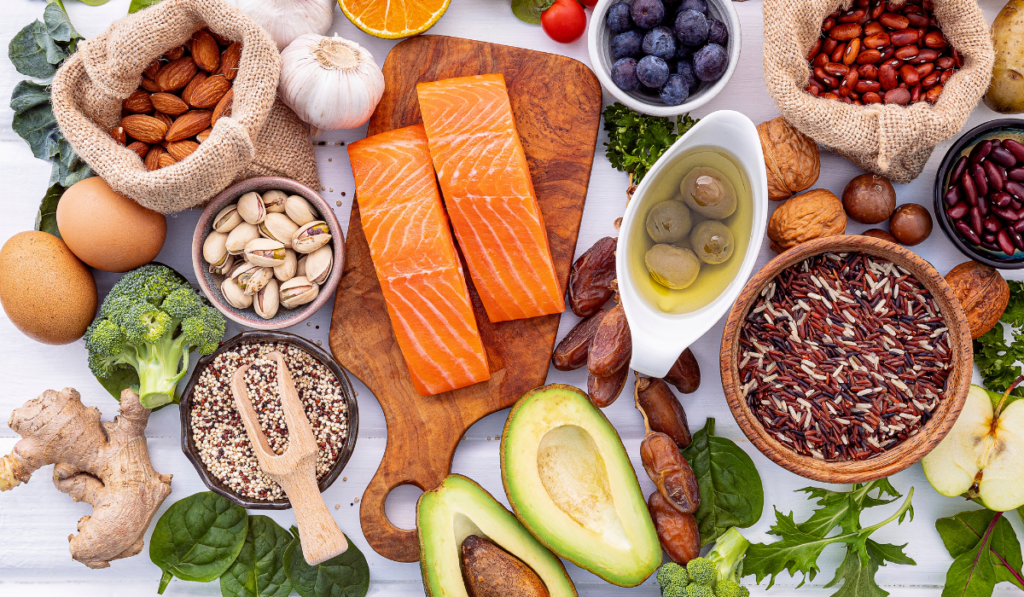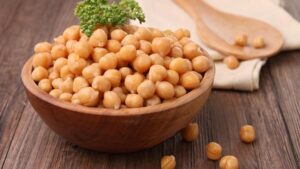Healthy food for high cholesterol

High cholesterol, also known as hypercholesterolemia, refers to an elevated level of cholesterol in the blood. Cholesterol is a fatty substance that is produced by the liver and is also present in certain foods. While cholesterol is essential for various bodily functions, high levels of LDL (low-density lipoprotein) cholesterol, often referred to as “bad” cholesterol, can increase the risk of heart disease and other health problems.
Here are some key points about high cholesterol:
Causes: High cholesterol can be caused by several factors, including an unhealthy diet rich in saturated and trans fats, lack of physical activity, obesity, smoking, age, genetics, and certain underlying health conditions such as diabetes, hypothyroidism, and kidney disease.
Types of cholesterol: Cholesterol is carried through the bloodstream by lipoproteins. There are two main types of lipoproteins:
Health risks: High cholesterol levels can contribute to the development of atherosclerosis, a condition where plaque accumulates on the inner walls of arteries, narrowing them and reducing blood flow. This can lead to various cardiovascular problems, including heart attacks, strokes, and peripheral artery disease.
Symptoms: High cholesterol itself doesn’t cause specific symptoms. It’s often known as a “silent” condition because people may not be aware they have high cholesterol until they experience complications such as a heart attack or stroke.
Diagnosis: A blood test called a lipid panel or lipid profile is used to measure cholesterol levels. It typically includes measurements of total cholesterol, LDL cholesterol, HDL cholesterol, and triglycerides (another type of fat in the blood).
Treatment and management: High cholesterol can often be managed through lifestyle changes and, if necessary, medication. The changes may include adopting a healthy diet rich in fruits, vegetables, whole grains, lean proteins, and healthy fats, as well as increasing physical activity, maintaining a healthy weight, quitting smoking, and limiting alcohol consumption. In some cases, medications like statins may be prescribed to help lower cholesterol levels.

Healthy food for high cholesterol
If you have high cholesterol, making changes to your diet can play a crucial role in managing your cholesterol levels. Here are some healthy food options that can help lower cholesterol:
- Fruits and vegetables: Incorporate a variety of colorful fruits and vegetables into your meals. They are rich in dietary fiber, antioxidants, and plant sterols, which can help reduce LDL cholesterol levels. Examples include berries, citrus fruits, apples, leafy greens, broccoli, carrots, and sweet potatoes.
- Whole grains: Choose whole grains instead of refined grains. Whole grains contain more fiber, which can help lower cholesterol. Opt for foods like whole wheat bread, brown rice, quinoa, oatmeal, and whole grain cereals.
- Legumes: Beans, lentils, chickpeas, and other legumes are excellent sources of soluble fiber and plant-based protein. They can help lower LDL cholesterol levels. Consider adding them to soups, salads, or making bean-based dishes.
- Nuts and seeds: Almonds, walnuts, flaxseeds, chia seeds, and other nuts and seeds are rich in heart-healthy fats, fiber, and plant sterols. They can help reduce LDL cholesterol when consumed in moderation. Enjoy a handful of nuts as a snack or sprinkle seeds over salads and yogurt.
- Fatty fish: Fish like salmon, mackerel, sardines, and trout are high in omega-3 fatty acids, which have been shown to improve cholesterol levels and reduce the risk of heart disease. Aim to include fatty fish in your diet at least twice a week.
- Olive oil: Replace unhealthy fats like butter or margarine with heart-healthy olive oil. Olive oil contains monounsaturated fats, which can help lower LDL cholesterol levels. Use it for cooking, dressing salads, or as a dip for bread.
- Avocados: Avocados are a great source of monounsaturated fats, fiber, and plant sterols. They can help raise HDL cholesterol levels and lower LDL cholesterol. Add slices of avocado to sandwiches or salads or enjoy guacamole as a dip.
- Low-fat dairy and lean proteins: Opt for low-fat dairy products like skim milk, low-fat yogurt, and reduced-fat cheese. Choose lean protein sources such as skinless poultry, fish, legumes, and tofu.
It’s important to remember that while these foods can contribute to a heart-healthy diet, it’s also essential to limit or avoid foods high in saturated fats and trans fats. These include fatty meats, full-fat dairy products, fried foods, processed snacks, and baked goods.
Consulting with a registered dietitian or healthcare professional can provide personalized dietary recommendations tailored to your specific needs and cholesterol levels.




